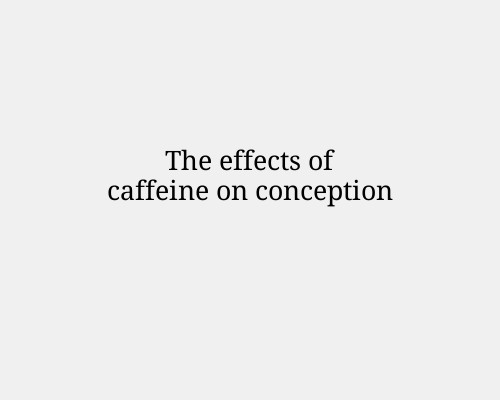
Caffeine is one of the most widely consumed stimulants in the world, found in coffee, tea, energy drinks, soft drinks, and chocolate. While moderate caffeine intake is generally considered safe for most people, research suggests that it may have an impact on fertility and conception for both men and women. This article explores how caffeine affects reproductive health, the recommended intake for those trying to conceive, and alternative strategies to support fertility.
How caffeine affects female fertility
Hormonal imbalance
Caffeine can influence hormone levels, particularly cortisol and oestrogen. Elevated cortisol (a stress hormone) may interfere with ovulation, while changes in oestrogen levels can disrupt the menstrual cycle, making it harder to conceive.
Delayed conception
Studies suggest that high caffeine intake is associated with prolonged time to conception. Some research indicates that consuming more than 200–300 mg of caffeine per day (about two to three cups of coffee) may reduce fertility by delaying ovulation or affecting egg quality.
Increased risk of miscarriage
High caffeine intake has been linked to an increased risk of early pregnancy loss. Caffeine crosses the placenta, and since the foetus cannot metabolize it efficiently, excessive consumption may negatively affect implantation or embryonic development.
Effects on the fallopian tubes and uterus
Caffeine may impact muscle contractions in the fallopian tubes, potentially interfering with the transport of the egg to the uterus. It may also reduce blood flow to the uterus, which could affect implantation success.
How Caffeine Affects Male Fertility
Sperm quality and motility
Some studies suggest that excessive caffeine consumption may lower sperm count, decrease motility (movement), and increase DNA fragmentation in sperm, which can impact the ability to fertilize an egg. However, findings are inconsistent, and some research suggests minimal effects.
Testosterone levels and hormonal balance
Caffeine influences the adrenal glands, which produce hormones like testosterone. While moderate caffeine intake may slightly boost testosterone, excessive consumption could lead to hormonal imbalances that impair sperm production.
Oxidative stress and dna damage
Caffeine has been associated with increased oxidative stress, which can damage sperm cells and negatively affect male fertility. Antioxidant-rich diets can help counteract these effects.
Safe caffeine consumption for those trying to conceive
Health experts recommend limiting caffeine intake when trying to conceive. The general guidelines are:
Women: No more than 200 mg per day (about one to two cups of coffee).
Men: No more than 300 mg per day, though lower intake may be beneficial for sperm health.
Both partners: Reducing caffeine intake from all sources (coffee, tea, energy drinks, and chocolate) may improve fertility outcomes.
Alternatives to caffeine for energy and alertness
If you’re trying to cut back on caffeine while trying to conceive, consider these alternatives:
Herbal teas (such as chamomile or ginger) for relaxation and digestion.
Decaffeinated coffee or tea for a lower caffeine alternative.
Water with lemon to stay hydrated and boost energy naturally.
Regular exercise to improve circulation and energy levels.
Balanced nutrition with iron-rich and protein-packed foods to maintain steady energy levels.
Conclusion
While moderate caffeine consumption may not have a dramatic effect on conception, high intake can negatively impact both male and female fertility. Couples trying to conceive should consider reducing caffeine intake to improve their chances of pregnancy. By adopting healthier lifestyle habits and focusing on proper nutrition, hydration, and stress management, fertility outcomes may improve naturally.